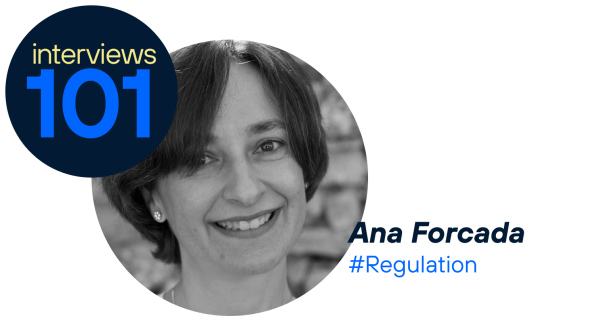YOU JOINED TELEFÓNICA IN 2007 – WHAT WAS YOUR CAREER PATH?
I’ve had a varied career – from being a civil servant in Spain as a state lawyer, I moved to the private sector in the late 1980s, as general counsel of three firms in Spain – Airbus, IBM and Airtel, which was the second mobile operator and whichwas acquired by Vodafone. For two years I was junior minister in charge of telecoms for the Spanish government, then worked for three years in a Spanish business school, Instituto de Empresa, and I joined Telefónica in 2007.
EVERY MAJOR OPERATOR HAS SOMEONE LIKE YOU. HOW WOULD YOU SUMMARISE YOUR JOB?
When I joined Telefónica my primary role was to lead the regulatory team, but I think that now my main job is to try to understand the changes in the market in terms of policymaking and global trends, and how a traditional telecoms company, as Telefónica is, should understand the new public challenges coming from the digital economy. Today the telecoms sector does not really exist any more – we are part of a different sector of the economy, which we can call the digital sector, and for sure this means new policy challenges. And unlike most operators we are a truly global company – the only other such major company is Vodafone – so we need to not just understand the new challenges coming from the digital world, but also how they are playing out in Europe and Latin America.
HOW DO YOU DESCRIBE THESE POLICY CHALLENGES FOR THE INDUSTRY?
I think that the first challenge is to understand this new industry and how we are in the middle of a new value chain. Now the map of competitors is totally different, and the challenges increasingly come from outside of the traditional industry, from the internet world, and we are no longer incumbents. We need to move from the agenda based on traditional regulatory topics such as access and investment to the new set of problems that will affect us in the future. A second challenge that for me is important is to try to put our customers at the centre of our policy. At Telefónica, we want to rebuild our public agenda around the customer, which means addressing the problems that our customers are facing. We are the one providing them their internet access, the raw material of this digital economy, but we think that we should go further and understand what problems are in the way of customers having a good internet experience.
OPERATORS DON’T HAVE A GOOD TRACK RECORD IN CUSTOMER EXPERIENCE AND SERVICE…
Of course this a big challenge for all of us in the telecoms industry. But you have to consider that we have a unique customer base – there is no other public service as universal as the telecoms sector and this means that to meet our customer expectations is very tough and much more difficult than in any other sector. We have contact with our customers every moment of every day. That is a unique situation. You have to provide customers with the level of satisfaction they are demanding, but at the same time it’s an opportunity. So while the track record of the industry in serving customers has not always been wonderful we think that this is another good reason to put them at the centre of our plans.
SO YOU’RE SUPPORTIVE OF REGULATIONS WHICH COME DOWN HARD ON CONSUMER PROTECTION?
I believe that in the telecoms industry much consumer protection is already applied, so this is no new situation for us. The main problem we have is that across this new value chain and the new digital economy I insist that general rules should apply to everyone. We don’t think that we need more regulation, not for the telecoms sector, and not for the so called over-the-top players. But take a situation where Telefónica has a lengthy service interruption – of course the authorities will start a procedure against us, it will be a headline in all the newspapers and our customers will have a lot of resources to make complaints. Now we have seen OTT communications services interrupted by more than one day, and customers have not had an opportunity to claim anything. For example, WhatsApp has gone down for hours, and there was not a single telephone line to call. You can say it’s a free service but that’s not so as Facebook paid $19 billion for the company so there is substantial financial value there. All we ask is for the same current regulation to apply to everyone.
YOU’VE BEEN TALKING ABOUT A TELEFÓNICA DIGITAL MANIFESTO – WHAT IS THIS ABOUT?
This is a set of ten recommendations we launched in 2014 under the theme of an open and safe internet for all. The idea is to open up discussion at European and global level, putting into a written document all the policy issues that we consider relevant, and some will be new to many in the public. One is to create fairer policy by establishing the same rules for the same digital services, and we also include creating a portable digital life – we believe consumers should be able to use all their data and applications regardless of platform – and in turn this means opening up mobile operating systems and apps stores. We also include, of course, privacy, education and making the internet available to everyone, and a policy recommendation I feel is especially important, transparency. Everyone should aim to be transparent in the way they act with customers, meaning the conditions of use of the internet and clear distinctions say between information and adverts in online search results.
IN THE MANIFESTO YOU SEEM TO BE CONCERNED MORE WITH OPERATING PLATFORMS SUCH AS ANDROID THAN OVER-THE-top players…
Yes, because this is not about specific companies, but about creating fair competition in the new digital world. Creating a portable digital life should be a key step towards that. But we are also totally open to any measures that can guarantee that our customers can access any content and run their preferred applications because we think we should work under the principles of network transparency and nondiscrimination. Yes, we want to manage our own networks and provide special services, within net neutrality rules, but we think this discussion should extend to the whole value chain, and that includes the smartphone operating systems. When you are at a certain level of market dominance it’s possible to choose whether you misuse your position, but at higher levels it happens anyway. This is why we are supporting Firefox, because it is an open operating system based on HTML5, an open standard. The problem is that many applications are not available because some companies believe it is not a good business to invest in it. This shows how complex the competitive issues are across the digital value chain. In the digital manifesto we explain why open web standards are important. I was particularly struck by comments by the previous chair of the FCC, Julius Genachowski, who was proud that two US companies have a 90% market share in mobile operating systems. Such imbalances are not good for the global digital economy and create many policy concerns.
WHAT ABOUT THE OVER-THE TOP PLAYERS?
I think that there is a challenge ahead for the them because they need to create new business models. Some have been quite successful in creating business models around adverts and operating systems – others less so – but it’s my view that we are seeing the limits of some of these models and new ones are needed for content and delivery of content.
DOES THE MANIFESTO ECHO SOME OF THE PROPOSALS IN EUROPE’S CONNECTED CONTINENT PACKAGE?
I think that the European Commission in the last year, mainly, has changed its diagnosis of the situation – only five years ago so it was very difficult to find a common view on the situation of the telecoms sector in Europe. There are certainly parts of European proposals we welcome and reference, such as the interoperability framework from the European Council. But they must move quickly – the European Union, which I think has been a big historical success, now needs to adapt the speed of its decision making processes and regulatory framework to meet the requirements of the global digital economy.
HOW DO YOU WEIGH UP THE REGIONAL APPROACHES?
Clearly in the past few years the US has done a much better job than Europe, probably because it was starting from some way behind. Now Europe is no longer the leader. Meanwhile Latin American regulators and administrations have preserved private investment as the engine of development, which is obviously very important for us, because they have understood that competition and development of infrastructure go hand-in-hand. We should not forget that the main challenge in Latin America has been how to promote the extension of telecoms services. Regulatory policy has been one of the critical success factors for the sector, but overall our view is that regulation should play a subsidiary role and that market forces and companies can solve access and investment problems, and authorities should only intervene when there are persistent failures of competition.
YOUR OVERALL MESSAGE ABOUT TELEFÓNICA IS THAT YOU ARE BECOMING A ‘DIGITAL TELCO’…
Yes, we are evolving to be a digital telco but it’s important to understand we are not competing head to head with internet services, we are operators providing access to the networks. We have a very important role to play in access platforms that will become increasingly more sophisticated and a critical part of the value chain in the digital economy.
This interview was done by the International Institute of Communications (IIC) and Intermedia and originally published on the IIC’s web.











